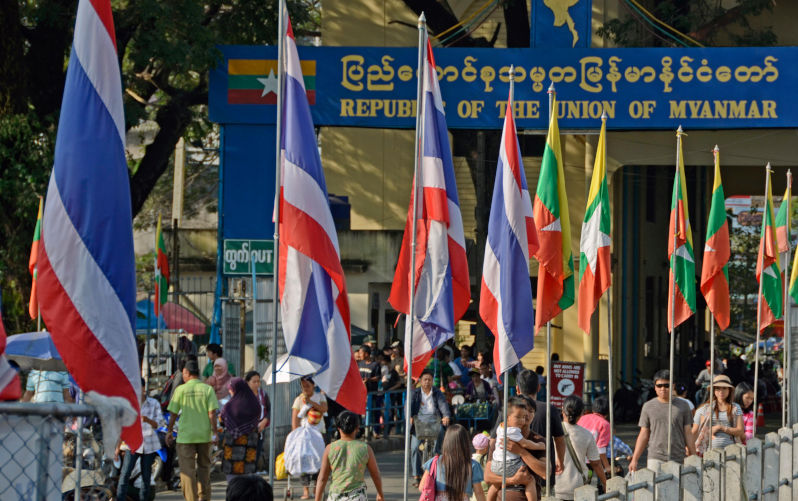Thailand’s unwinnable war on scammers
May 26, 2025
In February 2025, Thailand unleashed an unprecedented crackdown to salvage its reputation as a gateway for transnational — typically Chinese-run — scam networks lurking in mainland Southeast Asia. Having rescued thousands from scam dens in Myanmar, Thailand could claim “mission accomplished”. But Thailand knows that rings hollow when syndicates remain fluid and the fight is multi-front, all while domestic cleavages persist and the geopolitical costs of leaning on China are rising.
On taking office, Prime Minister Paetongtarn Shinawatra’s Government declared the fight against crime, cyber crime, fraud and transnational crimes among its 10 immediate-term policies. Chinese actor Wang Xing’s brief disappearance at the Thailand–Myanmar border in January 2025 jolted Thailand into taking concrete measures, including tightening penalties for unauthorised personal data disclosure and enhancing regional co-operation through trilateral efforts with China and Myanmar.
Equally noteworthy are Thailand’s arrest warrants for Colonel Saw Chit Thu and two other leaders of the Karen National Army, on human trafficking charges. With an estimated 7000 soldiers, the Karen National Army holds sway over — and profits from — notorious scam hotspots like Shwe Kokko and KK Park in Myawaddy in Myanmar, bordering Thailand’s Tak province.
Thailand’s arrest warrants are unlikely to be enforced in earnest due to the country’s longstanding tolerance, in the name of stability, of influential ethnic armed forces along the long and inadequately demarcated Thailand–Myanmar border. Thailand arguably needs more friendly buffers than ever as Myanmar’s instability worsens with no end in sight, fuelled by the junta’s relentless air strikes to recapture lost territories, US aid cuts and a powerful earthquake. Still, the arrest warrants send an unusually strong message that Thai tolerance has limits.
The most forceful Thai measure to date has been cutting off utilities — electricity, gas and internet — to five targeted locations. Though they have yielded some results, utility cuts may have hurt innocent residents, who rely on whatever critical infrastructure is publicly available, more than scammers, who are extraordinarily adaptive. In Tachileik, a targeted border town, 7500 households, 45 schools and five hospitals where 200 patients needed emergency oxygen were reportedly affected.
Some frustrated Myanmar nationals unsurprisingly launched protests and boycott threats against Thailand, to which Paetongtarn responded by saying that protecting Thai people comes first. Myanmar’s population may remember this as a hostile statement. In the context of a fast-ageing Thailand that is increasingly dependent on Myanmar’s labour force, the accumulation of anti-Thai sentiment is a long-term risk.
The gains from such heavy costs are not only modest, but also temporary. Media coverage of scammers’ responses to Thailand’s crackdown has centred on the utilisation of back-up generators and solar cells, and a greater turn towards Laos, Southeast Asia’s so-called “battery”. Further highlighting the limits of crackdowns, experts have pointed to tactical shifts — from centralised clusters to independent cells, thereby complicating tracking and pre-emptive action — and relocations to Cambodia. All these have been facilitated by Thailand’s slow reaction, rooted in infighting between coalition parties and various state agencies.
Scam hotspots in Cambodia, like Poipet and Sihanoukville, are resurging despite earlier crackdowns. Such developments matter greatly to Thai citizens’ welfare because scams targeting them are concentrated on the eastern Thailand-Cambodia border. Evidently, of the 215 individuals rescued from Poipet’s scam compound in late February, more than half were Thai. The western Thailand–Myanmar front, by contrast, is where foreign criminals prey on foreign victims.
There is strong incentive for a civilian Thai Government seeking electoral votes to prioritise the eastern front. Indeed, the Paetongtarn Government is already thinking of erecting a border wall. But the security apparatus has good reasons to classify Thailand’s western border with Myanmar as persistently most vulnerable. Systematically sustaining security on both fronts on a tight budget will be challenging going forward.
Co-operation with China is another tricky business. Given resource constraints, weak accountability and pervasive corruption, Thailand’s momentum against scammers can easily fade once media attention drops. In this sense, China’s active engagement under Assistant Minister of Public Security Liu Zhongyi’s directive is useful because it keeps Thailand on its toes.
Yet closer Thailand–China co-operation could compromise Bangkok’s geopolitical flexibility. Liu’s apparent unrestricted movement across Thailand in early 2025, for which he swiftly apologised following Thai sovereignty concerns, makes the question of China’s dominance hard to ignore.
For Thailand, losing balance seems easier than ever when most of its immediate neighbours are apparently pro-China and while the Thai–US alliance remains adrift. The Paetongtarn administration’s deportation of 40 Uighur detainees to China, much to the West’s dismay, has already been seen as overly accommodating to Beijing. Rarely does the United States take harsh action against Thai political elites, but this time, strong condemnation and visa restrictions were imposed on involved Thai officials.
Fighting entrenched illicit networks requires a multi-faceted approach that Thailand is employing. But more could be done, such as naming and shaming Thailand’s complicity in facilitating the scam movement. Even then, scammers can only be contained, not eradicated, as their resurgence in Cambodia shows. And as time passes, Thailand might find the financial and diplomatic costs of its crackdown too high. The struggle is ultimately protracted and unwinnable.
Tita Sanglee is Associate Fellow with the Thailand Studies Program at the ISEAS-Yusof Ishak Institute and a columnist at The Diplomat.
Republished from East Asia Forum, 9 May 2025
The views expressed in this article may or may not reflect those of Pearls and Irritations.

